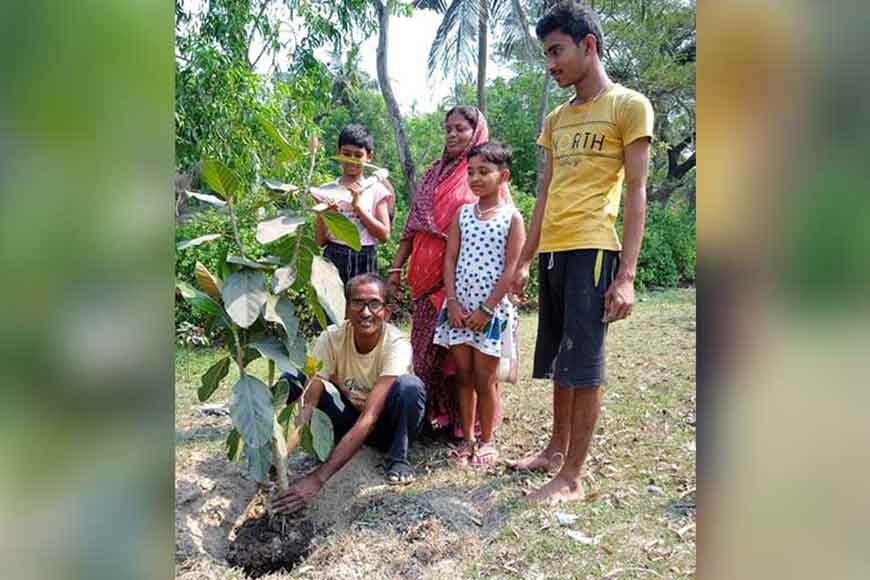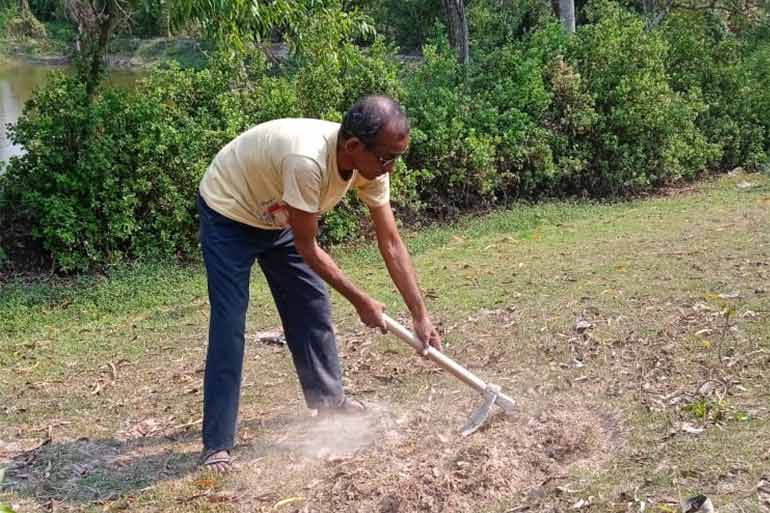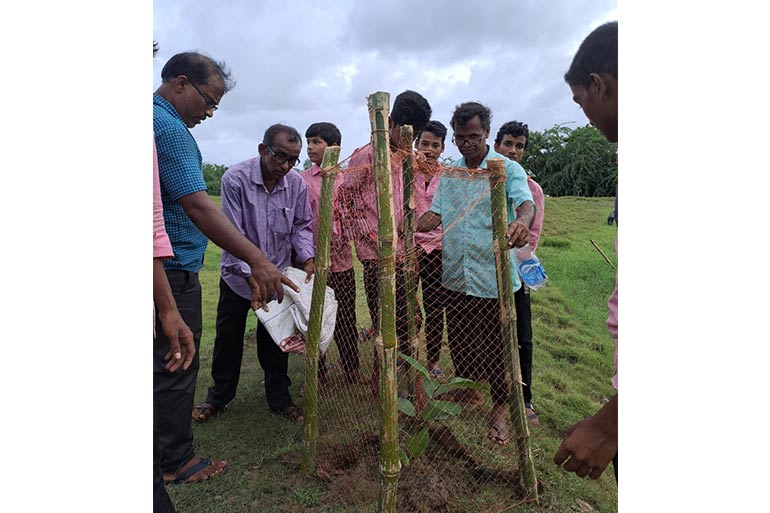Planting Trees, Writing Verses, Uplifting Lives — The Story of Bhola Nath Pal - GetBengal Story

“Apnare loye bibroto rohite/ ashe nai keho obonee pore/ sokoler tore sokole amra/ protyeke amra porer tore…”
We all grew up reading this poetry by Kamini Roy. But how many of us truly understand its meaning? And even if we do, how many of us are able to make its deeper essence the guiding light of our lives? However, this is exactly what Bhola Nath Pal, a son of the soil of Purba Medinipur, has done: he has fought against adversity, even through poverty, and brought light to society.
Bhola Nath Pal comes from Shyampur Kotka village under Khejuri Police Station. By profession, he is both a farmer and a ration shop worker. But by passion, he is a social worker, rhymester, lyricist, and writer on folk culture. After passing his secondary exams, he enrolled in higher secondary school. But driven by poverty, he dropped out midway and took up a job as a security guard in a private company to support his family. A few years later, he moved to Delhi to work in zari embroidery. When bad health forced him to return to Kolkata, he joined a zari workshop in Metiabruz. That was when his journey of standing beside people began. Since he was familiar with the streets of Kolkata, whenever someone from his village became sick, he would take them to Kolkata Medical College and Hospital. Often, he would spend two or three days there, sometimes even at his own expense.

How many of us would set our own work off to assist others? However, Bhola Nath has. And that was not all he did. To address global warming and make the earth greener, he began planting trees. He raises saplings in his own garden. Whenever he has guests at home, he gives them a sapling to show them how important it is to plant a tree. Recently, he planted 70 palm seeds in the cremation ground of his village. He personally tends to the little saplings that sprout from them. Whenever social workers call him to plant trees in villages, he goes willingly and has helped plant nearly a hundred banyan trees. If a researcher comes to study the regional history of Khejuri, people direct them to Bhola Nath’s home. He then travels with them from village to village, assists them in collecting information, provides them with food at his house, and also gives them a place to stay—all free of charge.
Bhola Nath states, “Atithi Devo Bhava! For me, a guest in my house is a fortune. It is prosperous for my family. Since my house is right by the Boga bus stand, many of the people from nearby villages used to leave their bicycles there before they traveled far away for work. At night, after getting off the bus, they would collect their cycles and return home. But on stormy or rainy nights, it wasn’t always possible for them to ride home. As a child, I would see my grandmother feed them dinner, make them beds, and let them stay the night. She would say, this is a household—if we abandon people in trouble, misfortune will befall us. From my childhood, especially during the monsoons, I saw someone or the other staying at our house almost every night. This sense of responsibility, I inherited from my grandmother.”
He speaks in rhyme, and often breaks into verses mid-conversation. As a child, he would watch his father write greetings on gifts before going to weddings or annaprashan ceremonies. Inspired, he too began writing verses at the age of ten. That pen has never stopped. Over the years, he has written many rhymes, poems, jhumur songs, and folk songs. The popular jhumur track sung by Jhuma Das—“Morda amar gechhe Kolkata, aina dibe nupur”—was penned by him. He also wrote songs performed by artist Bhaktadas Baul. Soon, he was invited to the famous Joydev Mela, where he came into contact with eminent lyricist Shibdas Bandyopadhyay, music composer Kalyan Sen Barat, Jayanta Dey, Sanjit Mondal, and Baul legend Purna Das Baul. He went on to write 68 folk songs. Just as his artistic voyage was thriving, he lost his father and had to return to Shyampur Kotka from Kolkata, where he began to work on a farm and at a ration shop.

Even with this adjustment, his creative momentum has not subsided. He has published his poetry collection "Smriti Hoye Thak," and has been working tirelessly on writing about folk culture for years. His work in magazines and journals demonstrates the challenges faced in rural life—stories that are often neglected. As an example, he was the first to write about two fisherwomen, Kalpana Bar and Alpana Bar.Today, not just in Khejuri but across West Bengal, people know about their lives. They are now invited to different events and felicitated—only because of Bhola Nath Pal.
In this way, Bhola Nath Pal continues to shine a light into dark alleyways, showing society the path forward.
Note: Translated by Krishnendu Mitra
To read the original Bengali article, please click here










